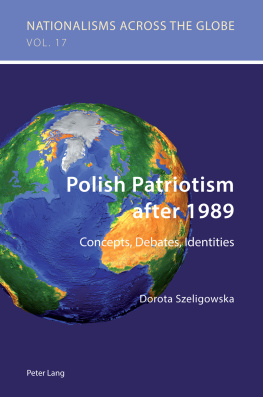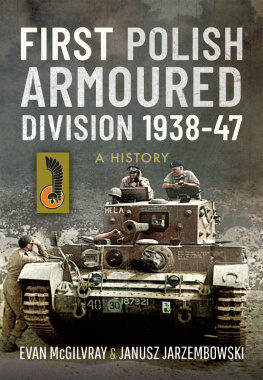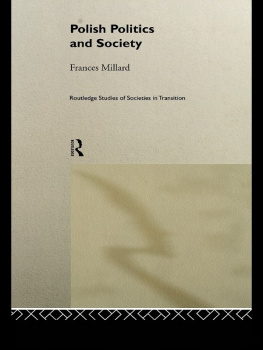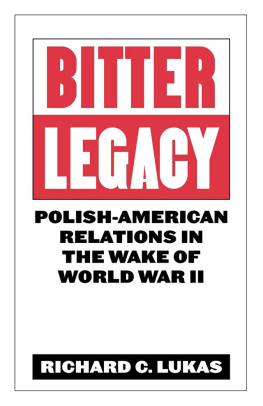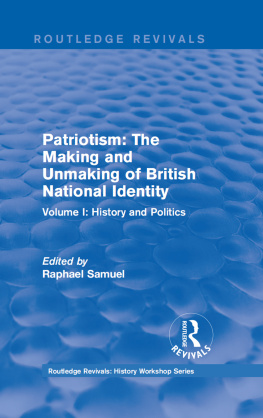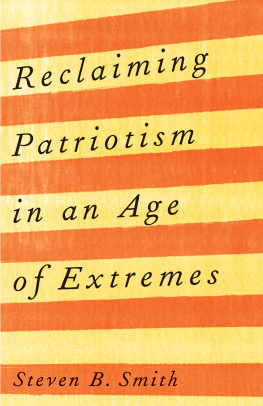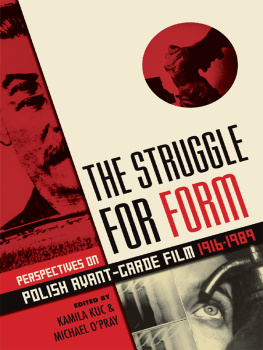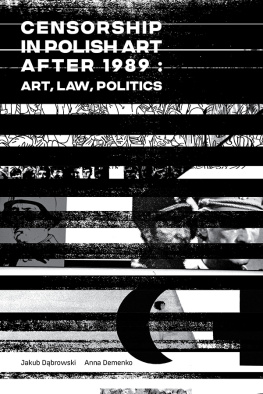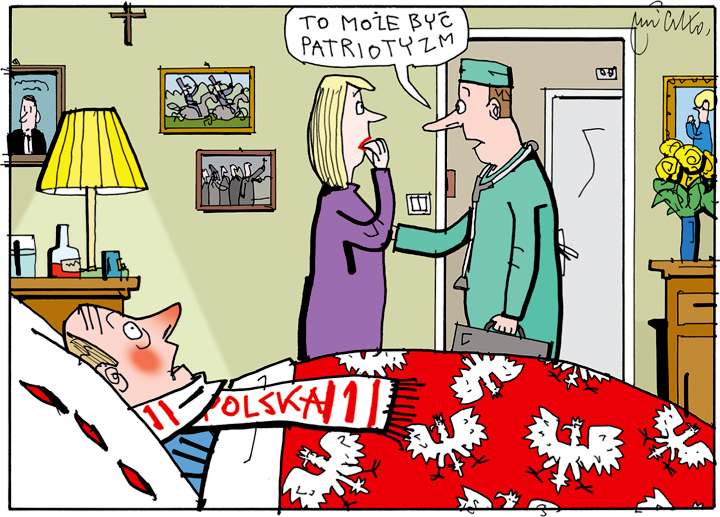Contents
Page List
NAT IONALISMS ACRO SS THE GLOBE
VOL. 17
SERIES EDITORS
Dr Tomasz Kamusella
(University of St Andrews, Scotland, UK)
Dr Krzysztof Jaskuowski
(University of Social Sciences and Humanities, Poland)
EDITORIAL BOARD
Balzs Apor (Dublin)
Peter Burke (Cambridge)
Monika Bar (Groningen)
Andrea Graziosi (Naples)
Akihiro Iwashita (Sapporo)
Sawomir odziski (Warsaw)
Alexander Markarov (Yerevan)
Elena Marushiakova and Veselin Popov (Sofia)
Alexander Maxwell (Wellington)
Anastasia Mitrofanova (Moscow)
Michael Moser (Vienna)
Frank Lorenz Mller (St Andrews)
Sabelo J. Ndlovu-Gatsheni (Pretoria)
Balzs Trencsnyi (Budapest)
Sergei Zhuk (Muncie, Indiana)
PETER LANG
Oxford Bern Berlin Bruxelles Frankfurt am Main New York Wien
Dorota Szeligowska
Polish Patriotism after 1989
Concepts, Debates, Identities
PETER LANG
Oxford Bern Berlin Bruxelles Frankfurt am Main New York Wien
Bibliographic information published by Die Deutsche Nationalbibliothek.
Die Deutsche Nationalbibliothek lists this publication in the Deutsche Nationalbibliografie; detailed bibliographic data is available on the Internet at http://dnb.d-nb.de.
A catalogue record for this book is available from the British Library.
Library of Congress Control Number: 2016931843
Cover image NASA/Goddard Space Flight Center Scientific Visualization Studio
ISSN 1662-9116
ISBN 978-3-0343-1992-8 (print)
ISBN 978-3-0353-0813-6 (eBook)
Peter Lang AG, International Academic Publishers, Bern 2016
Hochfeldstrasse 32, CH-3012 Bern, Switzerland
All rights reserved.
All parts of this publication are protected by copyright.
Any utilisation outside the strict limits of the copyright law, without the permission of the publisher, is forbidden and liable to prosecution.
This applies in particular to reproductions, translations, microfilming, and storage and processing in electronic retrieval systems.
This publication has been peer reviewed.
About the author(s)/editor(s)
Dorota Szeligowska holds a PhD from the Doctoral School of Political Science, International Relations and Public Policy at Central European University in Budapest, where she specialized in political theory and comparative politics. She currently lives and works in Brussels and is a visiting scholar at the Dijon campus of Sciences Po, where she lectures on the history of communism, the sociology of post-communism and EU affairs.
About the book
This book analyses the concept of patriotism and the contestation over its meaning in key public debates in Poland over the last twenty-five years. It focuses on the strategies used to define, re-shape and bend the notion of patriotism, which during this period has become a central issue in Polish political discourse.
Contemporary Polish society is characterized by a growing polarization of the public sphere. Rivalry between former communists and former dissidents has been progressively replaced by internal opposition within the ranks of once-dissident allies, now divided into civic-minded critical patriots and nationalist-oriented traditional patriots. This division reemerges regularly during key moments in Polish public life most recently in the aftermath of the highly contested 2015 parliamentary elections. By tracing the evolution of the debate over patriotism since 1989, this book provides crucial insights into the current political situation.
This eBook can be cited
This edition of the eBook can be cited. To enable this we have marked the start and end of a page. In cases where a word straddles a page break, the marker is placed inside the word at exactly the same position as in the physical book. This means that occasionally a word might be bifurcated by this marker.
| v
: It may be patriotism. Andrzej Mleczko.
| ix
This book is the result of my doctoral research carried out at the Doctoral School of Political Science, Public Policy and International Relations at Central European University in Budapest. I am deeply indebted to my supervisors, professors Lea Sgier, Balzs Trencsnyi and Nenad Dimitrijevic, for their help during my studies.
I also want to recognize the importance of the support of the Visegrad Scholarship Program of the International Visegrad Fund in the initial years of my doctoral studies.
I would like to thank all the teachers and researchers whose valuable advice helped me to attain this milestone. Im deeply indebted to Hans-Dieter Klingemann, the first professor who inspired me to follow an academic career. I also want to thank Georges Mink for academic challenges at Sciences Po Paris and College of Europe, and for encouraging me to do a PhD at CEU. I want to express my appreciation towards those whom I had the pleasure to meet during my doctoral studies and at conferences, and who took their time to discuss my research and share their thoughts in order to help me advance: Jan-Werner Mller, Joanna Michlic, Genevive Zubrzycki, Joanna Kurczewska, Maciej Janowski. I presented earlier versions of some of the chapters in this book at a number of conferences: ECPR General Conference in 2013 and 2014, BASEES Annual Conference in 2011, 2013 and 2014, and Graduate Network Conferences in 2010 and 2013, and I am grateful for all the insightful comments I received on these occasions, which helped me to finalize the manuscript of my doctoral dissertation and this book.
My endless gratitude goes to my loving parents Renata and Jacek, and friends who have put up with my tight schedule during the process of writing, and have always been encouraging. While I will not be able to thank everyone specifically, Olga Lblov, Divna Manolova, Andrs Szalai and Francesca Micheletti need to be mentioned.
I dedicate this book to my grandmother Czesia and aunt Irka, who were not there to see the end of this process, but have always been my biggest supporters.
| xi
It may be patriotism. Andrzej Mleczko.
Heroes of our liberty. Introductory billboard and an example of specific billboards.
Patriotism of tomorrow. Billboard 1.
Patriotism of tomorrow. Billboard 2.
The photograph of the alleged diggers of Treblinka.
| 1
The concept of patriotism is strongly embedded in the political languages of some countries, such as the United States of America. It has also been an object of theoretical reflection in the field of political theory over the past 30 years, and a number of conceptualizations have been proposed to establish the grounds for a stable and viable political allegiance of citizens to their respective polities. One of these is constitutional patriotism, a conceptualization that emerged in Germany in the 1980s in the context of the Historians debate [Historikerstreit], about the approach to the nations war past. The idea of constitutional patriotism, looking beyond a purely national framework of reference, was later suggested as a possible desirable version of political allegiance to the European Union, perceived as a post-national community.
In 1989, the political changes that swept the communist regimes in Central and Eastern Europe, leading also to the dislocation of the Soviet Union, placed a number of countries that had only a vague, if any, experience of democracy, on the road to democratic transformation. It seems natural that debates about the nature of allegiance and national identity ensued. Yet in Poland in particular, the persistence of discussions about the concept of patriotism reaches beyond merely understanding questions related to national community and statehood, and provides insights concerning broader political culture and nature of contestation.

